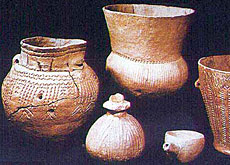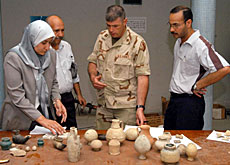Switzerland and Britain close ranks on stolen art

A Swiss-British conference on stolen cultural goods wrapped up in Geneva on Friday with calls for increased international cooperation to combat the trafficking of art and artefacts.
Around 150 experts and officials took part in the two-day “Not for Sale” forum, which highlighted efforts being made to tackle the illicit trade.
Worldwide, stolen art is the third-largest illegal market behind drugs and arms, according to Interpol and the UN’s cultural body, Unesco.
Yet many of the meeting’s participants said the issue had not received the public or political attention it deserved.
“Governments need to raise the profile of cultural goods to the same level of priority as tobacco, arms and alcohol,” said Ann-Marie Dryden of Britain’s Customs and Excise.
Cracking down
During the conference, participants stressed the importance of new laws designed to crack down on the buying and selling of plundered objects in Britain and Switzerland – two of the art world’s top transit centres.
In an attempt to repair their countries’ tarnished reputations as turntables for stolen goods, Swiss and British officials repeatedly stated that the updated legislation would make life tougher for dishonest dealers.
Until recently, Swiss law treated cultural goods in the same way as other types of merchandise, including televisions and toasters.
But under the new law, people convicted of art trafficking could face up to two years in jail and fines of up to SFr200,000 ($162,000).
In addition, the owner of stolen artwork now has 30 years to claim it back instead of just five.
Implementation
“These laws provide a long-overdue barrier to the trafficking of cultural goods,” said Andrea Raschèr of the Swiss Federal Culture Office.
“But now we have to make them work, and the proof of that will be in the pudding,” he told swissinfo.
His comments were echoed by David Gaimster of Britain’s Department for Culture, Media and Sport, who emphasised the importance of intelligence gathering and enforcement.
“The frameworks are in place, but now it’s a matter of delivering on our commitment,” said Gaimster. “This will include identifying loopholes, improving due diligence and raising our standards.”
Weak borders
Several speakers highlighted the role of customs officers as the first line of defence in blocking the import and export of stolen goods.
“Some 650,000 people, 350,000 private vehicles and 25,000 trucks cross into this country each day,” said Beat Frei of the Swiss Customs Office. “And all of that is dealt with by just a few hundred officers.”
He added that the shortage of personnel made it difficult to deal with the sheer volume and variety of goods passing into the country.
“We’re dealing with 160 separate laws ranging from agriculture and precious metals to wildlife and raw material… so cultural goods are just one small part of what we’re looking for.”
Frei’s British counterpart, Anne-Marie Dryden, added that the problem was compounded by a lack of expertise.
“Customs officers aren’t trained to be cultural experts or art historians,” she said. “We’re doing what we can to stop the import and export of cultural goods but it’s probably not enough.”
swissinfo, Anna Nelson in Geneva
Parliament approved new legislation last year aimed at preventing art trafficking, bringing Switzerland into line with a 1970 Unesco Convention.
The Federal Office for Culture, which drew up the new law, said Switzerland had earned a reputation as a transit centre for stolen works of art.
The import and export of cultural goods is a SFr 1.5 billion market in Switzerland.

In compliance with the JTI standards
More: SWI swissinfo.ch certified by the Journalism Trust Initiative










You can find an overview of ongoing debates with our journalists here . Please join us!
If you want to start a conversation about a topic raised in this article or want to report factual errors, email us at english@swissinfo.ch.